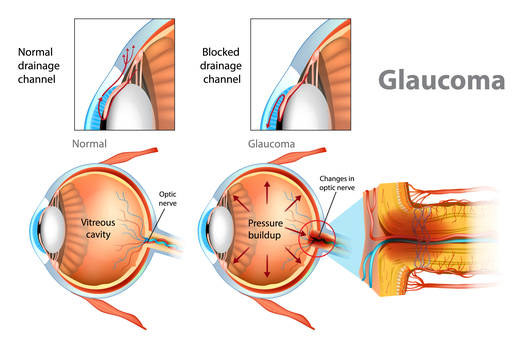TOP GLAUCOMA SPECIALIST IN JABALPUR
At Roshan Netralaya and Retina Foundation Super Specialty Eye Hospital in Jabalpur. The second leading cause of blindness in the world is glaucoma. There are an estimated 12 million people affected in India. Our team of eye specialists in Jabalpur specialize in glaucoma surgery. Glaucoma specialists on our team have years of experience.

What is Glaucoma?
Glaucoma is a group of eye conditions that damage the optic nerve, the health of which is vital for good vision. This damage is often caused by an abnormally high pressure in your eye.
Glaucoma is one of the leading causes of blindness for people over the age of 60. It can occur at any age but is more common in older adults.
Many forms of glaucoma have no warning signs. The effect is so gradual that you may not notice a change in vision until the condition is at an advanced stage.
Because vision loss due to glaucoma can’t be recovered, it’s important to have regular eye exams that include measurements of your eye pressure so a diagnosis can be made in its early stages and treated appropriately. If glaucoma is recognized early, vision loss can be slowed or prevented. If you have the condition, you’ll generally need treatment for the rest of your life.
- Patchy blind spots in your side (peripheral) or central vision, frequently in both eyes
- Tunnel vision in the advanced stages
- Severe headache
- Eye pain
- Nausea and vomiting
- Blurred vision
- Halos around lights
- Eye redness
If left untreated, glaucoma will eventually cause blindness. Even with treatment, about 15 percent of people with glaucoma become blind in at least one eye within 20 years.
When to see a doctor
Promptly go to an emergency room or an eye doctor’s (ophthalmologist) office if you experience some of the symptoms of acute angle-closure glaucoma, such as severe headache, eye pain and blurred vision.
Request an Appointment at Roshan Netralaya and Retina Foundation Best Eye Hospital in Jabalpur
The damage caused by glaucoma can’t be reversed. But treatment and regular checkups can help slow or prevent vision loss, especially if you catch the disease in its early stages.
Glaucoma is treated by lowering your eye pressure (intraocular pressure). Depending on your situation, your options may include prescription eye drops, oral medications, laser treatment, surgery or a combination of any of these.
Eyedrops
Glaucoma treatment often starts with prescription eye drops. These can help decrease eye pressure by improving how fluid drains from your eye or by decreasing the amount of fluid your eye makes. Depending on how low your eye pressure needs to be, more than one of the eyedrops below may need to be prescribed.
Glaucoma surgery side effects include:
- Cornea problems
- Cataract problem
- Vision loss
Before the surgery you must consider and discuss surgery pros, cons and plan.
Acute angle-closure glaucoma is a medical emergency. If you’re diagnosed with this condition, you’ll need urgent treatment to reduce the pressure in your eye. This generally will require both medication and laser or other surgical procedures.
You may have a procedure called a laser peripheral iridotomy in which the doctor creates a small opening in your iris using a laser. This allows fluid (aqueous humor) to flow through it, relieving eye pressure.
Request an appoint at Roshan Netralaya and Retina Foundation Eye hospital, Jabalpur
At Roshan Netralaya and Retina Foundation Eye hospital, Jabalpur we design your eye testing, using new treatments, interventions and tests as a means to prevent, detect, treat or manage this disease.
